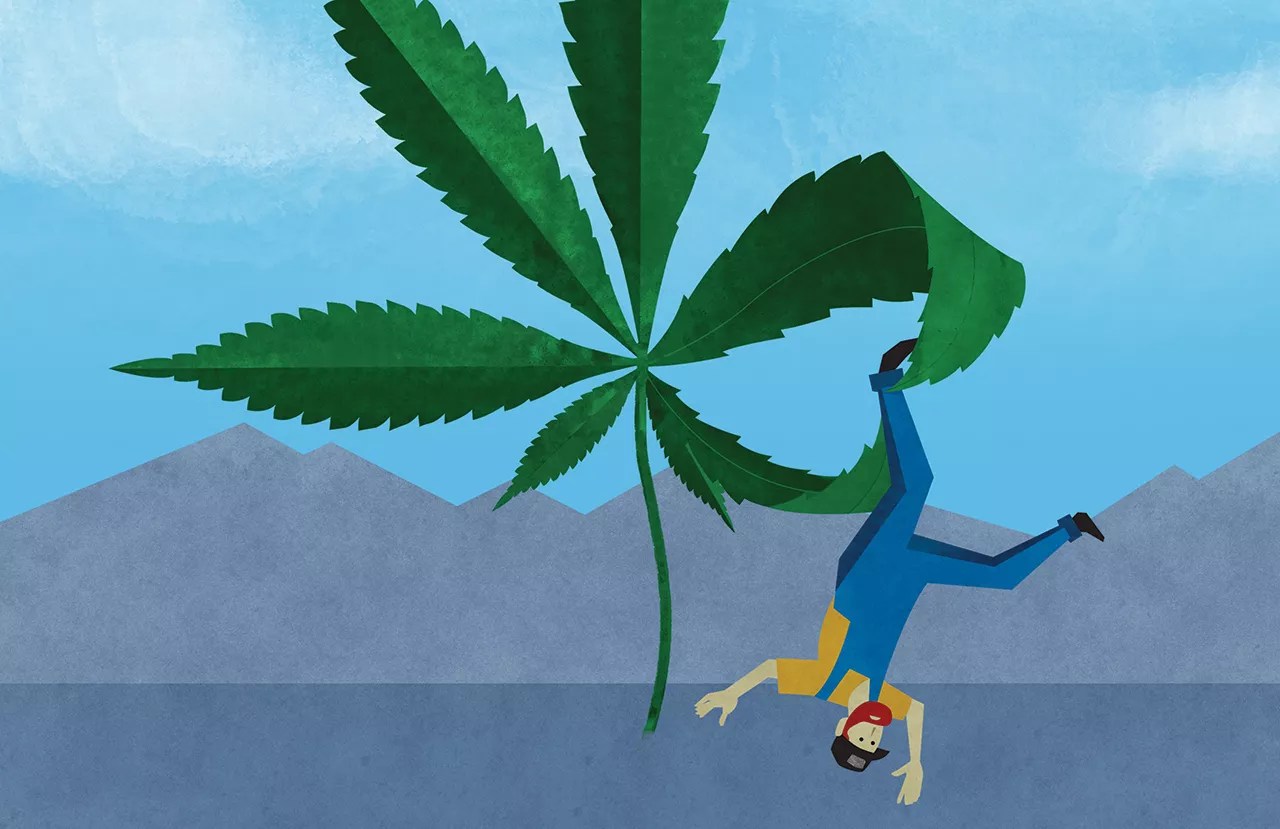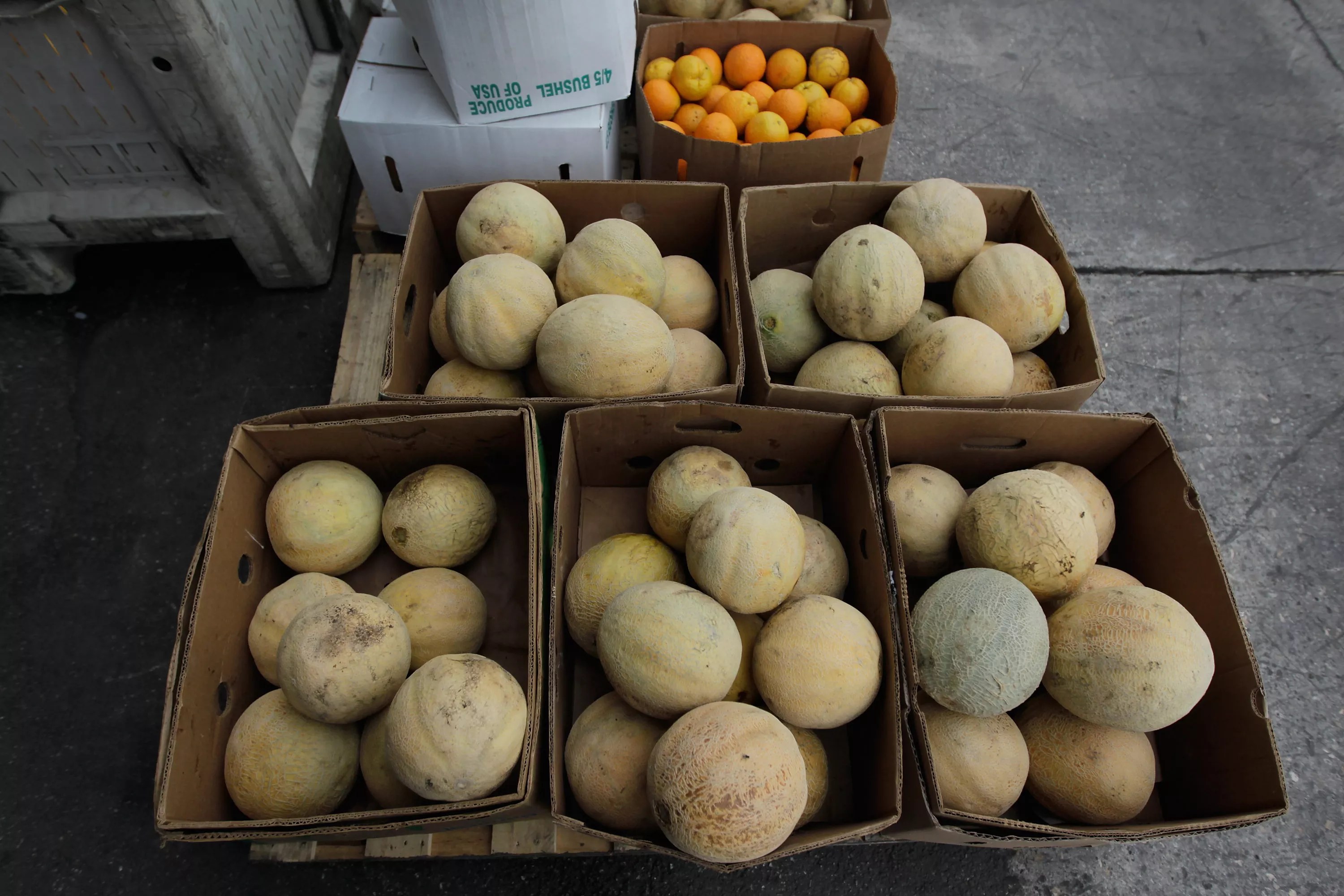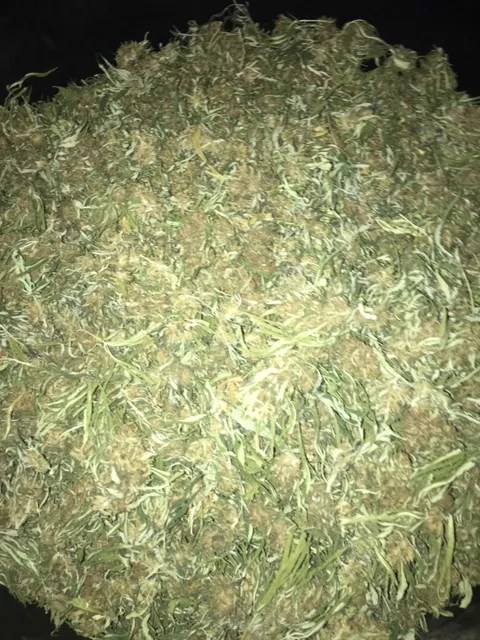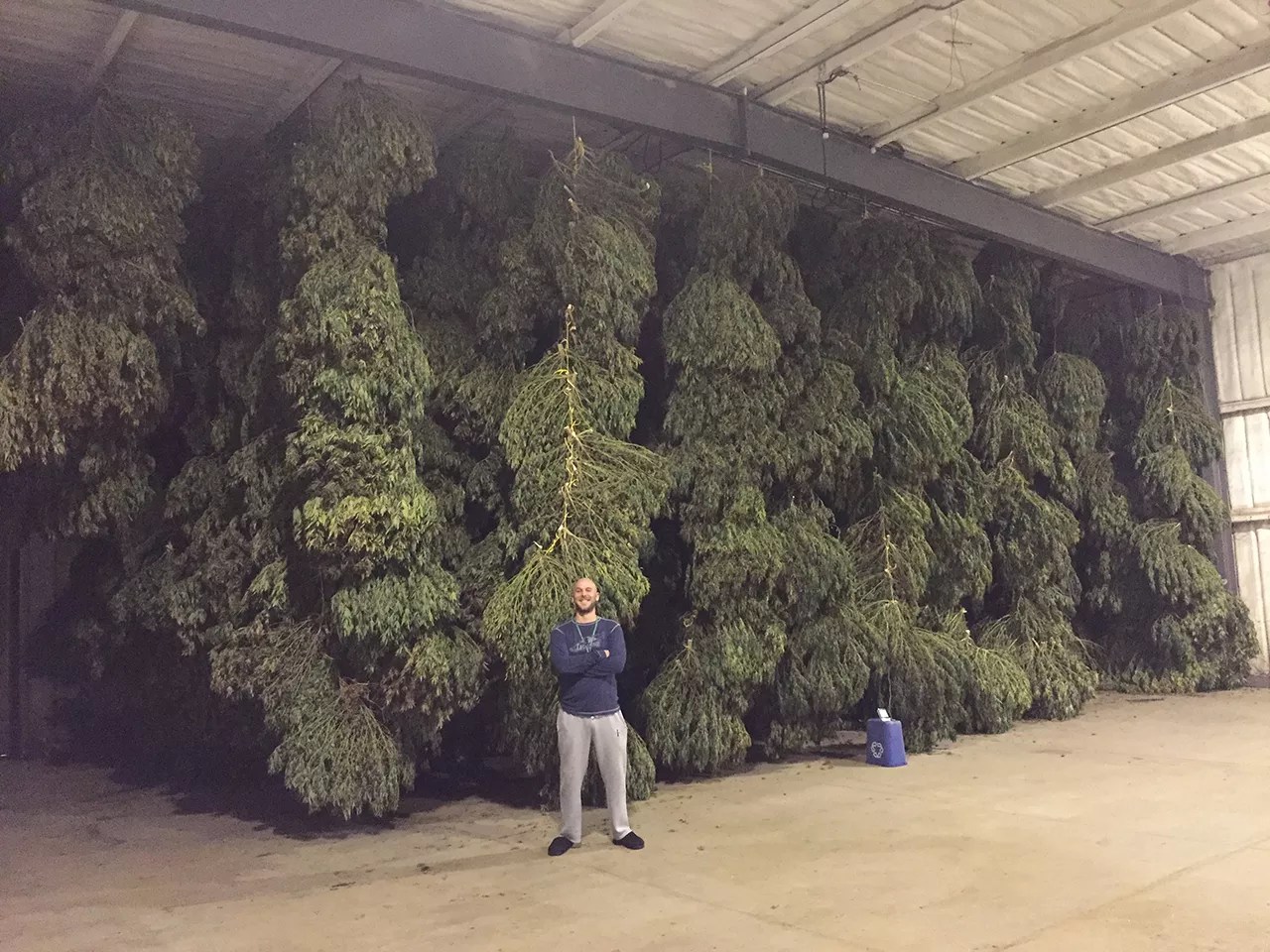
Jay Vollmar

Audio By Carbonatix
Eric Jensen feels trapped. By now, the 43-year-old thought he’d be able to travel from his home in southeastern Colorado to see his son play college ball in the Midwest. But instead, he can’t cross the border into Kansas. He’s stuck hanging around his home town, where most of the residents have turned their backs on him, believing that he’s a hardened drug dealer. Instead, he’s facing criminal charges for something that’s completely legal in Colorado: hemp.
Eric and his brother, 39-year-old Ryan Jensen, grew up in the town of Holly, ten miles from the Kansas border. Early on, they started working on the family farm, the fourth generation to do so, and by 2007, they’d taken over for their father, Robert. They grew wheat and corn and onions and cabbage, which was harvested and shipped to grocery stores across the country. But their biggest crop was cantaloupe.
In 2011, an outbreak of listeriosis, a foodborne disease that primarily affects pregnant women, newborns, older adults and others with weak immune systems, was traced to the Jensen Farms…but not before it had caused 33 deaths and scores of illnesses across 28 states. Investigators found that a contaminated condensation line had allowed water to get onto the floor, which had become difficult to clean; dirty equipment had been used to wash and dry the melons harvested from the field. The water samples tested positive for listeria; the investigators called the equipment “uncleanable.”
The federal Food and Drug Administration deemed it the deadliest outbreak of foodborne illness since 1924. Ultimately, the brothers pleaded guilty to misdemeanor counts of introducing adulterated food into interstate commerce – a charge that can carry penalties of up to six years in prison and a $1.5 million fine. Even so, in February 2014, Magistrate Judge Michael E. Hegarty sentenced each brother to five years of probation and six months of home detention; they were also ordered to perform 100 hours of community service and pay $150,000 in restitution fees.

The listeria outbreak was traced to cantaloupes from the Jensen family farm.
Getty Images/Joe Raedle
At the sentencing in federal court in Denver, Hegarty said that he “delivers both justice and mercy at the same time,” and explained that sentencing the brothers to prison along with fining them wouldn’t be the greatest example of mercy. Instead, he said, he’d decided to allow the brothers to keep working in order to support their families and pay off their restitution fees.
Both apologized to the victims’ families. “This has been a huge tragedy. We are very, very sorry. We hope it leads to better understanding of food safety,” Eric Jensen said. Jensen Farms had filed for bankruptcy two years earlier. But thanks to the 2014 U.S. Farm Bill, which allowed hemp to be grown as part of research or pilot programs, hemp was becoming a major crop in Colorado, which now had more acres of the plant under cultivation than any other state in the country. Eric Jensen’s son had already started a hemp farm, Scotty’s Gardens, on the former Jensen Farms in 2014; it looked like a way for Eric and Ryan to raise cash to pay off their restitution fees.
But then they became entangled in this country’s confusing relationship with hemp.

Eric (left) and Ryan Jensen back on the family farm.
courtesy Ryan Jensen
Early on, it looked like 2017 would shape up to be “the most incredible year ever” for the hemp farm, Ryan Jensen recalls. Other farms had been slow to grow hemp, and the brothers would command high prices for their crop, which they shipped to a variety of companies around the country.
On January 3, 2017, FedEx picked up 300 pounds of hemp at the Jensen farm that was destined for a company in California. Rather than continuing west, the truck headed east to a FedEx facility in Liberal, Kansas, where a manager contacted the Kansas State Patrol, saying he was “smelling marijuana.” Lieutenant Josh Biera responded. “While I was in the parking lot of the FedEx warehouse and exited my vehicle, I immediately smelled the odor of marijuana, based on my experience and training, coming from the warehouse,” Biera’s affidavit reads. In the warehouse, he found three boxes each the size of a washing machine, “and the odor of marijuana became stronger the closer I got to them. … In plain view inside the boxes were one large clear plastic bag that contained green vegetation that had the appearance and odor of marijuana, based on my 23 years of law enforcement experience. Also, inside the box, in plain view, was paperwork that read Industrial Hemp Registration, from Colorado Department of Agriculture.”
That was enough to persuade Biera to contact Seward County Attorney Russell Hasenbank and obtain search warrants so that he could open the boxes. Inside, he found not just more of that green vegetation, but two pieces of paper, both with the heading of Colorado Department of Agriculture; one noted that “the sample tested below 0.3% THC on a dry weight basis. Accordingly the plants tested are in compliance with the Colorado Industrial Hemp Regulatory Program Act.”
I immediately smelled the odor of marijuana, based on my experience and training, coming from the warehouse.”
But they weren’t compliant with behind-the-times Kansas. Biera did a field test of the boxes and determined that each contained plants that tested positive for THC. He also found several smaller bags, and reported that “it was easy to see that these separate bags of marijuana were trying to be hidden within the large bag of marijuana.”
The Kansas State Patrol seized the three boxes, and one sample from each box was transferred to the Kansas Bureau of Investigations Forensic Laboratory in Great Bend, Kansas, for testing, Biera reported.
Continuing his investigation, he spoke with FedEx employees, who said that Eric Jensen had loaded the truck in Holly; Eric had also been calling the company wondering why the hemp delivery had not been made. Authorities asked him to come to Kansas to discuss the situation. Eric Jensen declined.
“Eric was just doing a favor for his son that owns the hemp farm,” Ryan Jensen recalls. “I was the one that arranged the shipment. FedEx knowingly took the shipment to Kansas, and then their employees just call the police for it.”
On January 31, 2019, the Seward County Attorney’s Office charged both brothers with four felonies, including distributing “an hallucinogenic drug, to-wit: Marijuana,” as well as possession of marijuana with intent to distribute. Why had it taken so long for Kansas to come up with the charges? Among other things, the Kansas lab where the samples had been sent did not yet have the facilities in place to test hemp for THC, nor did the Kansas Department of Agriculture. And the department refused to allow the testing to be done out of state, not even in neighboring Colorado.

Confiscated hemp in Kansas.
Courtesy of Eric Jensen
But Seward County was no longer waiting. Instead, they hit the Jensens with charges that could land them with ten to twelve years in prison.
“This has been a long and tortured case,” says Van Hampton, the Dodge City lawyer Eric Jensen hired on February 20. “We’ve requested to dismiss the criminal case, but the prosecution wants to continue it. It all comes down to a matter of spite and stubbornness on their side.”
Eric Jensen believes that Kansas didn’t even want to do those tests. “They knew they were wrong after all this time,” he says. “Because if they were proven wrong, they would have to worry about the liabilities.” Hampton filed a civil order to have the hemp package tested, but authorities still stalled. “Kansas wanted so badly to charge us with marijuana possession,” Ryan Jensen remembers. “They just wouldn’t accept a test result from the State of Colorado or an independent lab. It really put everything at a stalemate.”
But according to the Kansas Department of Agriculture, the state had a good reason for the testing delay. “Our lab wasn’t up and running yet, and we were at the beginning stages of industrial hemp,” says communications director Heather Lansdowne.”We asked for the case to get back to us by November of this year, and ran tests when the labs were up and running.”
Almost three years after the State of Kansas seized the three packages of hemp, the Kansas Department of Agriculture finally reported on November 27, 2019, that the contents of those packages all tested below 0.3 percent THC concentration, and therefore qualified as hemp.
However, the Seward County Attorney decided to proceed with the criminal case, claiming that possession of hemp was illegal in Kansas in 2017, when the packages were seized.
Kansas legalized industrial hemp in 2018 under the Industrial Hemp Research Program, allowing licensed growers, processors and distributors to cultivate hemp for research purposes. The Kansas Legislature also authorized a commercial industrial hemp program earlier this year, but the program will not become effective until the Kansas Department of Agriculture’s regulations are fully adopted and the plan is approved by the U.S. Department of Agriculture.
But those moves come too late for the Jensens.

Hemp drying at the Jensen family farm, now devoted to hemp.
Eric Jensen
The brothers are not the only ones to be charged by states that have mistaken hemp for marijuana. In Colorado, a state that should know better, a Greeley woman was pulled over in Eagle County in May for allegedly carrying 100 pounds of marijuana to Las Vegas; she faced a $1 million fine and thirty years in prison until it was proven that she was transporting legal hemp. A New York man was arrested in November for transporting 106 pounds of hemp that police originally believed to be marijuana. Two truck drivers were arrested in Oklahoma on similar suspicions. Both of those cases were dropped.
But so far, Kansas has refused to drop the charges against the Jensens, even though the state’s own lab finally confirmed that they were shipping hemp from a state where it was perfectly legal to another state where it was also legal.
“These things happen more than we even hear about,” says Eric Steenstra, president of Vote Hemp, a national nonprofit. “Hemp and marijuana don’t look or smell that different. That makes it easy for authorities to have a mixup and arrest people for transporting marijuana when in reality it’s hemp.” While he suggests that those carrying hemp across state lines should carry as much paperwork as possible to show that they’re delivering hemp, not marijuana, that didn’t help in the Jensens’ case; their documentation from Colorado was in the boxes.

Today, the Jensens’ property is a hemp farm.
Courtesy of Eric Jensen
Kansas has issued warrants for the arrest of both Eric and Ryan Jensen. No hearing has yet been set for their criminal charges, which cannot proceed without them present. And so far, Colorado has refused Kansas’s request to extradite Eric.
But the brothers still feel like prisoners. Eric says that his personal life has taken a toll. “I have a son who plays college sports in Nebraska, and I can’t go watch him play,” he says. “I have another son who’s a senior in college, and I can’t travel to watch him play ball, either. We have this reputation that we’re drug dealers, and when you have a reputation like that, no one wants to deal with you.”
“I can’t go out in public at all,” Ryan adds. “We’ve just been driven to the ground. We can’t purchase equipment from reputable dealers because they think we’re shipping marijuana, and we’re no longer able to bring stuff in and out.”
On September 12, Hampton filed a civil action against the Kansas Highway Patrol, Seward County and Seward County Attorney General Russell Hasenbank for continuing to press charges against the brothers. The next hearing in that case is set for January 6.
“All of this has been one big stalemate, and incredibly difficult to deal with.”
“Seward could be dealing with malicious-prosecution allegations,” suggests Patrick Goggin, a senior attorney with the Hoban Law Group, who notes that both national and Colorado law gave the Jensens the right to ship hemp outside of Colorado. “They might realize they don’t have any evidence that there was criminal intent when shipping the package, but still want to hold leverage over the Jensens. The prosecution has a strict policy against anything related to cannabis and will do whatever they can to prosecute someone for it.”
“FedEx Freight cooperates with law enforcement in any investigation of possible criminal activity involving our services or network,” the company said in a statement. “Please direct additional questions regarding any investigation to the appropriate authorities.” The Seward County Attorney’s Office didn’t respond to numerous requests for comment; the Kansas State Patrol said it couldn’t discuss the case because it’s been turned over to Seward County.
“They think they have the law on their side,” Hampton says. “All of this has been one big stalemate, and incredibly difficult to deal with.”
But after all they’ve been through, the brothers recognize that they’re going to have to deal with it. “I assumed everything would be dismissed on day one,” recalls Ryan Jensen. “But all we can do for now is to discuss the next step and hopefully be done with this after so many years.”